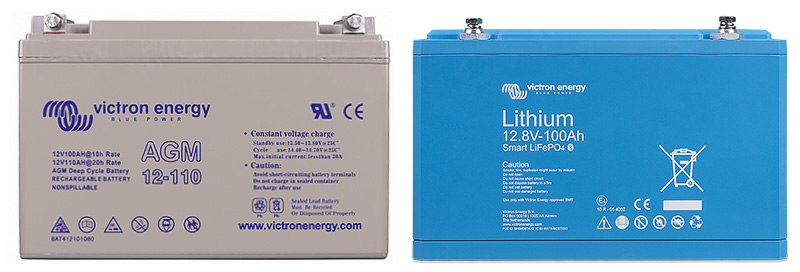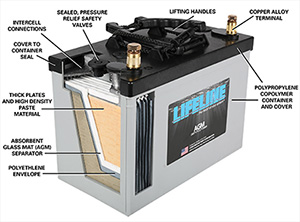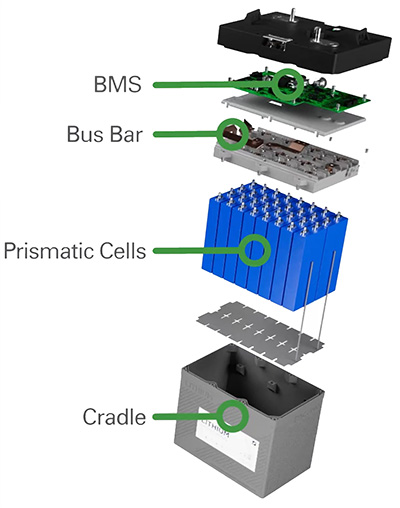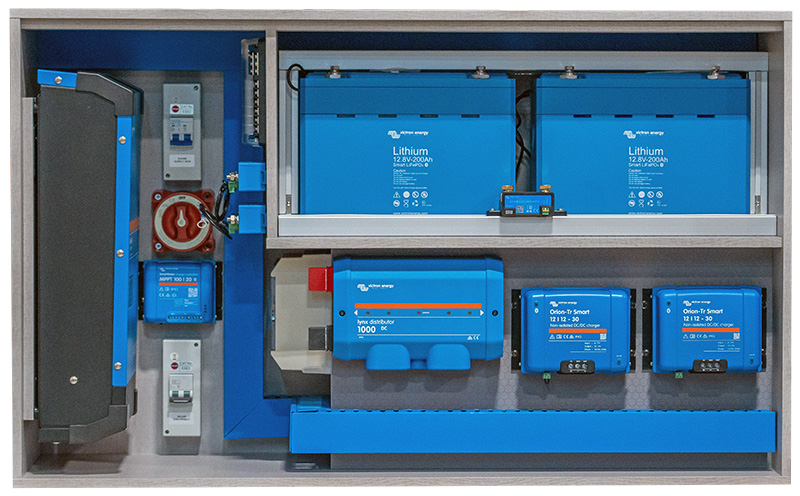Lithium vs AGM for Caravans, Motorhomes and Marine Uses
Date Posted:28 February 2023
With so many options available in the market, it's essential to understand the differences between each type of battery to make an informed decision. In this blog post, we will compare AGM and Lithium Iron Phosphate (LiFePO4 or LFP) batteries and explain why Lithium Iron Phospate is a better choice in terms of energy efficiency, longer life span, and faster charging.

AGM and Lithium Iron Phosphate batteries (LiFePO4)
AGM Batteries

AGM batteries were invented in the1970's and considered a superior alternative to a standard lead-acid batteries. They use a fibreglass mat to absorb the electrolyte, making them spill-proof and maintenance-free. They are widely used in applications that require deep cycle and backup power, including Caravans, Motorhomes, and Marine uses. AGM batteries have a low self-discharge rate and can operate at a wide range of temperatures, however temperatures typically over 30°C start to see reduced lifespan and is the reason you should never install an AGM battery in the engine compartment of a vehicle. They are a popular choice due to their low cost and high reliability. However, they have a limited cycle life, which means that they can only be discharged and recharged a certain number of times (typically 200-300) before they need to be replaced and that life cycle is greatly reduced even further by higher temperatures and exceeding their Depth of Discharge (DoD) of 50% before requiring to be charged. Under ideal conditions, the life expectancy of most AGM batteries is within 3-5 years.
Quality AGM batteries we sell include Deka, Lifeline and Victron Energy.
Lithium Iron Phosphate (LiFePO4 / LFP) Batteries

LiFePO4 batteries are a type of Lithium-ion battery that uses Iron Phosphate as the cathode material. They have a higher energy density, longer cycle life, and faster charging time than AGM batteries. They are also lighter and more compact than AGM batteries, making them ideal for applications where space is limited. LiFePO4 batteries have a high discharge rate and can operate at a wide range of temperatures. They are also safer than other types of Lithium-ion batteries, as they are less prone to thermal runaway makeing them a safer choice for applications that require high reliability and safety
One of the key benefits of LiFePO4 batteries over AGM batteries is their longer cycle life. While AGM batteries typically last for 200-300 cycles, LiFePO4 batteries can last for up to 5,000 cycles or more. This means that LiFePO4 batteries are a more cost-effective solution in the long run, as they require fewer replacements and maintenance. Their Depth of Discharge (DoD) is on average at 80% therefore providing more energy before requiring to be charged again compared to an AGM battery at only 50% DoD.
One drawback of LiFePO4 batteries over AGM batteries is that they are sensitive to low temperatures, which means they cannot be charged below 0°C without risking damage. However there are LiFePO4 batteries with inbuilt warming pads available allowing charging to take place at -20°C.
There are several types of cells used in LiFePO4 batteries, including cylindrical, prismatic, and pouch cells. Each type has its own benefits and drawbacks.
- Cylindrical cells are relatively inexpensive and easy to manufacture. However, they have a lower energy density compared to other types of cells, which means they have a shorter runtime.
- Prismatic cells are commonly used in electric vehicles and energy storage systems. They have a higher energy density compared to cylindrical cells, which means they can provide more power in a smaller space. However, they are more expensive to manufacture and can be less durable compared to other types of cells.
- Pouch cells are commonly used in portable electronic devices, such as smartphones and tablets, however do appear in some 12V/24V Lithium batteries. They are lightweight and thin, which makes them ideal for use in devices that require a slim design. However, they are less durable compared to other types of cells
Quality Brands of LFP/LiFePO4 batteries we sell include Discover Battery, Invicta, Pylontech, Remco and Victron Energy.
Applications in Caravans, Motorhomes, and Marine uses
In applications such as Caravans, Motorhomes, and Marine uses, where space and weight are important factors, LiFePO4 batteries offer several advantages over AGM batteries. LiFePO4 batteries are lighter and more compact, which means they take up less space and can reduce the overall weight of the vehicle or boat. They also have a higher discharge rate, which means they can provide more power for longer periods of time.
Case studies and examples of LiFePO4 batteries in these applications have shown significant improvements in efficiency and performance. For example, in a caravan, replacing AGM batteries with LiFePO4 batteries can result in a weight reduction of up to 60%. In a motorhome, LiFePO4 batteries can provide more power for longer periods of time, allowing for extended periods of off-grid camping. In marine applications, LiFePO4 batteries can provide reliable and long-lasting power for essential systems such as lighting, navigation, and communication. Please note for new marine installations AS/NZS 3004:2 must be observed. This rules out many of the generic brands of LiFePO4 batteries on the market.

Van fitout using 2x 12.8V 200Ah Victron Energy Smart Lithium Batteries in Parallel to create a 400Ah bank.
Comparison between AGM and LiFePO4 batteries
When comparing AGM and LiFePO4 batteries, there are several factors to consider. While AGM batteries are less expensive upfront, LiFePO4 batteries are a more cost-effective solution in the long run due to their longer cycle life and lower maintenance requirements. LiFePO4 batteries also have a higher energy density, which means they can store more energy in a smaller space. They also have a higher discharge rate, which means they can provide more power for longer periods of time.
However, LiFePO4 batteries do have a higher upfront cost and require specialised charging equipment.
In conclusion, LiFePO4 batteries offer several advantages over AGM batteries in markets such as Caravans, Motorhomes, and Marine uses. They have a longer cycle life, higher energy density, and higher discharge rate, making them a more cost-effective and efficient solution in the long run. Brands such as Victron Energy, Pylonthech, and Discover Batteries offer reliable and high-quality LiFePO4 batteries for these applications.
When choosing the right battery for your specific application, it is important to consider factors such as weight, space, power requirements, and cost. By choosing the right battery, you can ensure reliable and long-lasting power for your vehicle or boat.
FAQs
-
What is the lifespan of LiFePO4 batteries compared to AGM batteries?
LiFePO4 batteries can last up to 6000 cycles or more, while AGM batteries typically last for 200-300 cycles.
-
Are LiFePO4 batteries more expensive than AGM batteries?
LiFePO4 batteries have a higher upfront cost, but they are more cost-effective in the long run due to their longer cycle life and lower maintenance requirements.
-
Can LiFePO4 batteries be used in all types of vehicles and boats?
LiFePO4 batteries can be used in a wide range of vehicles and boats, but it is important to choose the right battery for your specific application and adhere to any standards required per your application.
-
What is the difference between the output capacity of LiFePO4 batteries
The output capacity of LiFePO4 batteries varies depending on the specific battery model and brand. However, in general, LiFePO4 batteries have a higher discharge rate than AGM batteries, which means they can provide more power for longer periods of time. This makes them ideal for applications where high power output is required, such as in Caravans, Motorhomes, and Marine uses.
-
Do Lithium batteries require specialised battery chargers?
Yes, Lithium batteries require specialised battery chargers that are designed to maintain their specific charging profile. Using the wrong charger that does not have a lithium profile can damage the battery and will reduce its lifespan. However, many manufacturers of current battery chargers do offer a Lithium battery algorithm profile to ensure proper charging and maintenance so it is important to check.
-
Can I use a Lithium battery as a crank battery?
The majorityity of LiFePO4 batteries on the market today are not suitable as a cranking battery for your vehicle or boat. However there are a few models that do offer dual capabilities.
-
What is Depth of Discharge (DoD)?
Depth of Discharge (DoD) is a term used to describe the amount of energy that has been removed from a battery, relative to the total amount of energy the battery can store. In other words, it refers to the percentage of the battery's total capacity that has been used up.
For example, if a battery has a total capacity of 100 ampere-hours (Ah) and has discharged 50 Ah, the DoD would be 50%.
-
What is a Battery Management System (BMS)?
BMS stands for Battery Management System. It is an electronic system that is designed to monitor and control the various aspects of the Lithium battery, such as voltage, current, temperature, and state of charge. The primary functions of a BMS are to ensure the safe and efficient operation of the battery, and to maximise its lifespan and performance.
A typical BMS includes several components, such as sensors to measure battery parameters, a microcontroller to process the data and control the charging and discharging of the battery, and communication interfaces to allow the BMS to interact with other systems, such as a battery charger to stop charging when required.
Some of the key features of a BMS include:
-
Overvoltage and undervoltage protection - The BMS can detect when the battery's voltage is too high or too low and can take steps to prevent damage to the battery.
-
Temperature monitoring - The BMS can monitor the temperature of the battery and take steps to prevent overheating or overcooling.
-
Cell balancing - The BMS can balance the charge and discharge of each individual cell in a battery pack, ensuring that they are all operating at the same level and maximising the overall capacity of the pack.
-
State of charge estimation - The BMS can estimate the remaining capacity of the battery and provide accurate information to the user or system.
A BMS may be inbuilt to the battery case, these are commonly for drop-in replacement batteries to replace your AGM/Gel Battery. Larger and more custom systems typically have an external BMS available to control a number of batteries.
-
Overall, LiFePO4 batteries offer several benefits over AGM batteries in markets such as Caravans, Motorhomes, and Marine uses. They have a longer cycle life, higher energy density, and higher discharge rate, making them a more cost-effective and efficient solution in the long run. By choosing a reliable and high-quality LiFePO4 battery from a reputable brand such as Victron Energy, Pylonthech, or Discover Batteries, you can ensure reliable and long-lasting power for your vehicle or boat.
In summary, the choice between AGM and LiFePO4 batteries ultimately depends on the specific needs and requirements of the application. While AGM batteries are still a popular and reliable choice, the benefits of LiFePO4 batteries are becoming increasingly clear, especially in markets such as Caravans, Motorhomes, and Marine uses. With their reduced weight, longer lifespan, higher energy density, and higher discharge rate, LiFePO4 batteries provide a more efficient and cost-effective solution in the long run.
At Outback Marine, we pride ourselves on offering high-quality and reliable batteries from top brands such as Victron Energy, Pylonthech, and Discover Batteries. Our team of experts can help you choose the right battery for your specific needs and provide you with the appropriate charging equipment required for Lithium batteries. With our commitment to customer satisfaction and product quality, you can trust us to provide you with the best battery solution for your Caravan, Motorhome, or Marine application.






